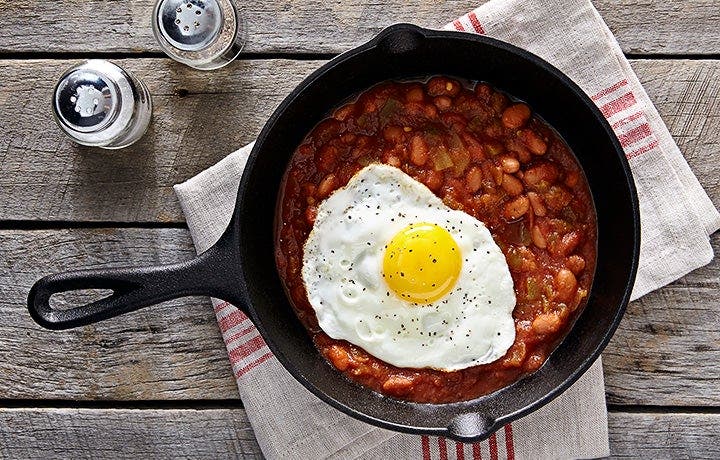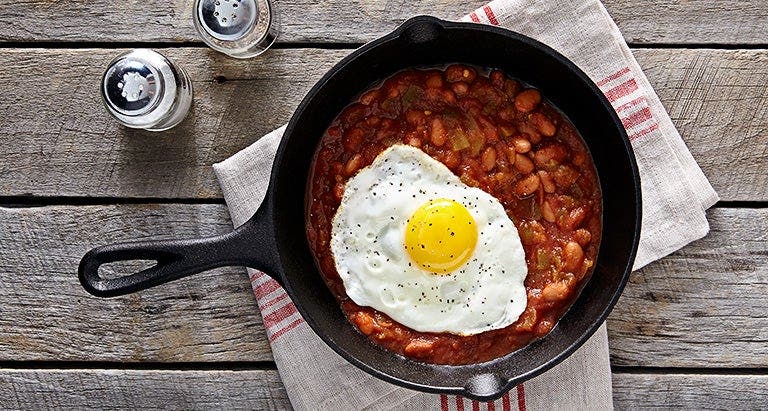Your top protein q’s, answered


In this article:
1/ How much protein do I need?
2/ What are the best sources of protein?
3/ How can I get protein at every meal?
4/ Are most people chronically low in protein?
5/ Can you get too much protein?
6/ Is a high-protein diet healthy for everyone?
7/ Should I be using protein powders and bars?
It seems like every week there’s a new high-protein regimen for weight loss that’s trending on social media, encouraging everyone to eat 50 grams of protein a day, or breaking triple-digit protein grams, or downing 30 grams within 30 minutes of waking up. Is hitting a certain amount of protein really the answer?
It’s true that everyone needs protein because it serves as building blocks for our bones, muscles, cartilage, skin, and blood. If you're trying to lose weight or maintain your current weight, protein can also help you feel fuller more quickly while you’re eating since it activates gut hormones like GLP-1 that signal satiety. And because protein is harder to break down than carbs or fats, your body also burns some of the calories from protein while processing it (20–30 percent, compared with 5–10 percent for carbs and 0–3 percent for fats).
In numerous studies, it’s been shown that people who follow higher-protein plans can better preserve lean muscle mass during weight loss. Most promising of all, people who continue to follow a higher-protein plan do better at maintaining their new weight.
Here we cut through the chatter and share what you need to know about protein to start harnessing its benefits.
How much protein do I need?
Sorry to social media, but protein doesn’t have a best-for-everyone number.
“There’s no one-size-fits-all protein recommendation, because needs can vary depending on many factors, including your age, sex assigned at birth, activity level, or health status,” says Christie Sauer, M.S., RDN, Development & Formative Research Manager at Weight Watchers. That’s why she recommends working with a WW registered dietitian to learn more about the protein amount and types that are right for you.
The recommended dietary allowance (RDA) to prevent protein deficiency for an average sedentary adult is 0.8 grams of protein per kilogram of body weight. But for anyone trying to lose weight, WW recommends getting at least 1 gram of protein per kg of body weight. To calculate your number, take your weight in kilograms (you can always put “X pounds in kilograms” into Google) and that’s how many grams of protein you want to hit every day, at a minimum. So for example, someone who weighs 200 lbs. (so, 90kg) would want to get 90g of protein per day.
You can also try the USDA DRI Calculator to determine how much protein you need. An easy way to keep track of your protein intake is through the WeightWatchers app, which now shows you a breakdown of the daily macros and nutrients you’re eating, including protein.
What are the best sources of protein?
“Not all proteins are created equal,” says Sauer. Sure, a cheeseburger has lots of protein from the beef and cheese, but it’s also loaded with saturated fat — so make sure you’re adding more protein through overall thoughtful food choices (you’ll find some examples of good protein sources below).
The WW program can guide you towards the best options through Points and ZeroPoint foods. ZeroPoint foods include a wide variety of lean proteins from both animal and plant sources. For all other foods, Points can help guide you towards the best options.
Some great lean sources of protein (many of them plant-based) include:
- Egg whites
- Fish or other seafood
- Lean meats, such as skinless, white-meat chicken or turkey
- Low-fat dairy
- Quinoa
- Soy
- Seeds
- Nuts
- Beans
- Lentils
- Hempseed
- Buckwheat
How can I get protein at every meal?
There are so many ways to mix and match your protein sources, but one example of a day with protein every time you eat (yep, even dessert) could look like this:
Breakfast: Pepper and Egg Pocket, made with two eggs and ½ large whole wheat pita pocket (15 grams protein)
Lunch: Creamy Roasted Tomato Soup and Whole Wheat Pizza (17 grams)
Snack: Greek Yogurt Ranch Dip with Bell Pepper Strips (12.5 grams)
Dinner: Beef and Vegetable Stir-Fry (33 grams)
Dessert: Chocolate Ice Cream Sundae (4.5 grams)
Total calories: approximately 1,220
Total protein for the day: 82 grams
You can check out lots of protein-packed recipes here.
Are most people low in protein?
Actually, no. Most people in the U.S. meet or exceed their protein needs (especially men ages 19-59), according to the Dietary Guidelines for Americans. The bigger issue is where our protein comes from. Most people in the U.S. are getting too much of their protein from meat sources and need to increase the variety of our protein sources, choosing meat less often.
People who are at risk of being chronically low in protein are those taking weight-loss medications, which drastically reduce appetites. People taking these medications need to especially prioritize getting enough protein in their meals.
Can you get too much protein?
Like nearly everything, too much of a good thing isn’t actually good. Our bodies can't store protein, so once your needs are met, any extra calories from protein are stored as fat, which doesn’t align with weight-loss goals.
Because many foods high in protein may also be high in total and saturated fats, eating too much of these types of foods can lead to elevated blood lipids and heart disease.
Is a high-protein diet healthy for everyone?
No — a high-protein diet isn’t recommended for people with kidney issues. That’s because too much protein can strain your kidneys, adding risk for people who are predisposed to kidney disease.
Should I be using protein powders and bars?
Generally, it’s best to try to get enough protein from whole foods rather than supplements. That’s because supplements often lack other helpful nutrients, such as iron and fiber. If you need to use a supplement, try to pair it with a high-fiber fruit, so your snack is a protein bar and an apple or a protein powder smoothie that includes berries. The Cleveland Clinic recommends making sure your protein supplement contains:
- At least 10 to 15 grams of protein
- Fewer than 15 grams of total carbohydrates
- Less than 200 to 250 calories
- Less than 5 grams of added sugar
Is it okay to get most of my protein at one meal?
From a weight loss perspective, the distribution of protein might not be as important as we think. A randomized controlled trial showed no difference in weight loss when comparing two groups eating the same amount of protein when one group had protein consistently throughout the day and the other group consumed it mostly at dinner.
But practically speaking, spreading protein out across meals and snacks may make it easier to reach your protein goals; we recommend aiming for around 15-30 grams of protein per meal. It's actually better to spread out the protein you eat more evenly throughout the day, since our bodies can only use what they need and can’t store protein. Research shows that going over than the recommended protein amount for one meal (for example, downing 40+ grams at once versus the 15-30 grams that are recommended) had no additional benefits.
If you are going to have more protein in one meal versus others, make it breakfast to get that “I feel full” payoff all day. Most people eat the bulk of their protein at dinner and the least at breakfast, but initial research shows that having a high-protein breakfast may help decrease hunger and cravings throughout the day.
The bottom line
Choosing a variety of protein sources from whole foods and spreading your protein out over the course of the day is the best way to feel full and support weight loss. And despite what the fitness bros may say, more protein isn’t always best — getting the right amount and the right kinds for your body’s own needs is.
This content is for informational purposes only and does not constitute medical advice, diagnosis or treatment. It should not be regarded as a substitute for guidance from your healthcare provider.
Satiety and regain: Journal of Obesity & Metabolic Syndrome (2020). “Clinical Evidence and Mechanisms of High-Protein Diet-Induced Weight Loss.”
https://pmc.ncbi.nlm.nih.gov/articles/PMC7539343/
https://www.mayoclinichealthsystem.org/hometown-health/speaking-of-health/are-you-getting-too-much-protein
https://pubmed.ncbi.nlm.nih.gov/38365118/
https://pmc.ncbi.nlm.nih.gov/articles/PMC3718776/
